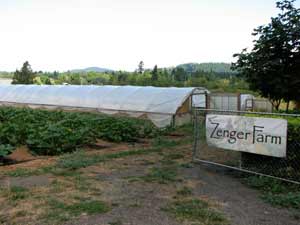It is a treasure hidden in plain sight.
You could easily miss it, speeding along the four-lane trajectory that is Foster Road. At this outskirt of Portland the view is mostly auto parts stores, wrecking yards, industrial parks; only patches of feral land and stands of mature Douglas Firs hint at an earlier, much more rural time. Not much of the farm is visible from behind the wheel of a car, just a glimpse of the red, refurbished farm house and bit of garden. But sloping down behind is a six-acre organic farm (one of the only working farms in the city limits), flanked by ten acres of wetland that is home to a richly-diverse ecosystem.
When the city of Portland purchased Zenger farm in 1994, it was in alignment with the dream and intention of Ulrich Zenger Jr. that the land be preserved as a farm and protected from the urban development that was rapidly advancing. In 1999 a fifty-year lease was granted to Friends of Zenger Farm, securing its future as a model of land stewardship and sustainable urban agriculture accessible to the public.
This is a unique and invaluable opportunity, especially for Portland’s kids, who visit the farm and get real lessons in where fresh food comes from, and how good it can taste. During the school year, yellow busses regularly pull into the parking lot at the farm; the air is full of the calls and shouts of discovery, of kids exploring a world without concrete beneath their feet. They visit and feed the chickens, maybe get to taste the fresh, raw honey from the farm’s hives. They weed and tend and harvest vegetables. This is not a curriculum-simulation of a farm: the work they’re doing is real, and they understand the difference. For many, this is the first time they have seen vegetables somewhere other than a fluorescently-lit grocery store. There is great pride and ownership in the harvesting of vegetables they helped grow.
In 2009, a record-breaking 4500 children visited the farm. The fees are nominal, but no one is turned away for lack of funds. Adults are encouraged to sign up to do volunteer work on the farm, and this has helped supply meaningful nutritional support to low-income residents of the surrounding neighborhoods, one which has long been underserved in terms of ready access to community gardens, farmers markets and full-service grocery stores.
In 2010, a seven-acre property adjacent to the farm was acquired, and promises exciting possibilities for the future of Zenger Farm. “This will allow us to launch our Neighborhood Food Innovation Program,” says Executive Director Jill Kuehler.
“We will double our farm acreage. And the extra produce grown will stay right in the neighborhood through a sliding scale CSA program. Folks will be able to pay with food stamps or volunteer in exchange for a CSA share. We’re planning on launching the program in 2011 with 15-20 shares and then increasing it in 2012 based on feedback from shareholders. We will be one of the first CSAs in the state to accept food stamps. The site will also have a community garden with 30 plots for low-income families who don’t have other opportunities or space for growing food. Our Healthy Eating on Budget classes, which taught over 200 families in 2010 about preparing healthy meals on a limited budget, will be offered to all CSA and community garden members.”
With an ongoing series of adult workshops in topics of organic gardening and food preservation, and the innovative Farmer in the Classroom Program, Zenger Farm is continuing to grow, now able to teach about good food and land stewardship nearly year-round.
I think Ulrich Zenger Jr. would be pleased.


